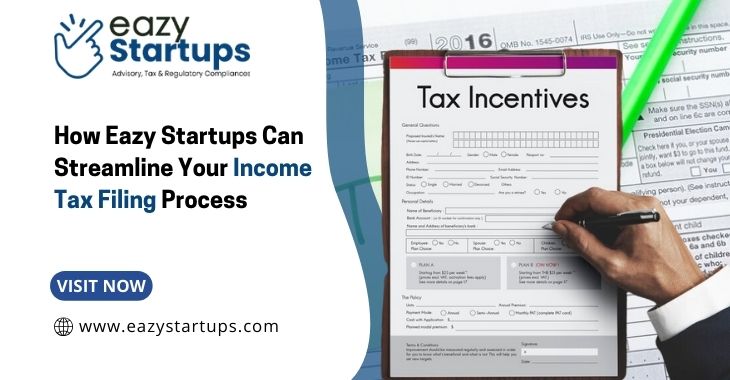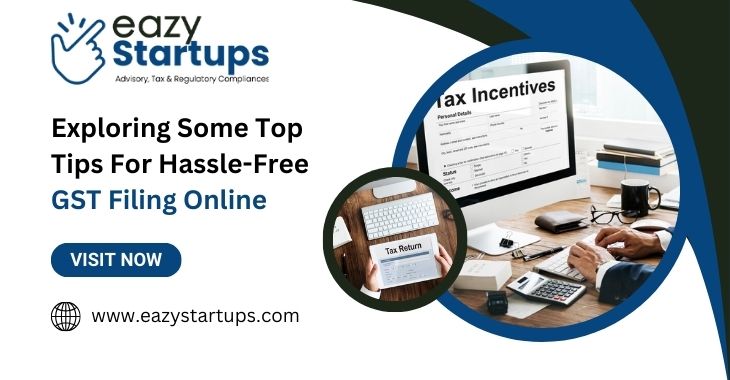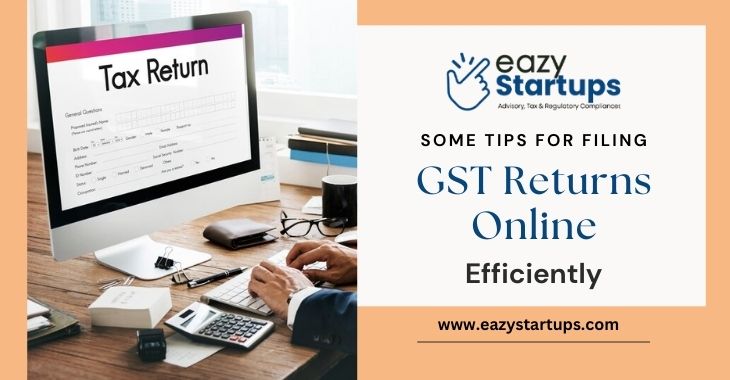It can be very difficult to navigate the complexity of Income Tax Filing, particularly for new and small firms. The procedure, from maintaining paperwork to comprehending tax requirements, may be intimidating. Thankfully, Eazy Startups, India, is available to assist. Here’s how Eazy Startups can simplify and ease paying your income taxes.
Let’s have a look:-
1. Expert Guidance Tailored to Your Needs
2. Efficient Document Management
3. Accurate Tax Calculations
4. Simplified Filing Process
5. Timely Updates and Reminders
6. Maximizing Deductions and Credits
7. Stress-Free Tax Season
Expert Guidance Tailored to Your Needs:
Each company has different tax requirements. Whether you’re a small business owner, a new startup, or both, Eazy Startups provides professional advice. Our knowledgeable staff is adept at deciphering the subtleties of different tax laws and can offer guidance to maximize your financial position while guaranteeing compliance. This individualized strategy assists you in navigating challenging tax situations with confidence.
Efficient Document Management:
It can be very difficult to remember to keep track of all the paperwork required for tax filing. Eazy Startups makes this easier by effectively handling and arranging your financial documentation. We preserve your records in one easily accessible spot using contemporary digital tools, which makes it simple to retrieve and submit documents as needed. Because of this structure, you will save time and run less of a danger of misplacing critical documents.
Accurate Tax Calculations:
Precise tax computations are essential to minimize fines and optimize possible reimbursements. The expert staff at Eazy Startups guarantees that your tax computations are accurate. We carefully go over your financial information, apply the proper tax rates, and look for any credits and deductions that may be available. By utilizing our knowledge, you can be sure that your tax returns are precise and optimized.
Simplified Filing Process:
The actual Online Income Tax Filing procedure can be difficult and time-consuming. Eazy Startups handles filing and preparing your tax returns, relieving you of the strain. We guarantee that every document is accurately filled out and filed on schedule, saving you the worry of submitting paperwork at the last minute and possibly making mistakes.
Timely Updates and Reminders:
Tax deadlines and legislative modifications are prone to being overlooked. With frequent updates and reminders about crucial deadlines and legislative changes, Eazy Startups helps you stay on track. Through our proactive communication, we ensure you are always informed of impending deadlines and any new tax laws that may impact your files.
Maximizing Deductions and Credits:
Although credits and deductions can drastically lower your tax obligation, they are frequently disregarded. Eazy Startups is skilled in identifying possible credits and deductions for which you may be eligible. We thoroughly review your spending and financial activity to ensure you’re taking advantage of all the savings that can help you pay less in taxes overall.
Stress-Free Tax Season:
One of the most tax-related difficult aspects of managing a business might be handling taxes. Eazy Startups reduces your worry by effectively handling your tax-related responsibilities. You may concentrate on managing your business or spending time with your family while our knowledgeable staff handles the technicalities. Our methodical approach guarantees the least amount of hassle during tax season.
Final Thoughts
Eazy Startups, India, provides a comprehensive solution to streamline your Income Tax Filing procedure. Our services are made to make tax filing simpler in every way possible, from fast updates and accurate computations to individualized expert advice and effective document management. If you choose us, you can handle tax season’s difficulties easily and confidently since you’ll know that your legal and financial needs are in good hands. Eazy Startups is the best choice if you’re searching for a trustworthy partner to help you efficiently handle your taxes. Visit our website today to learn more about our services.











Recent Comments